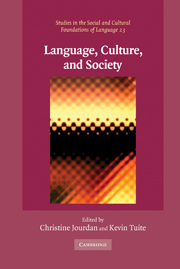Book contents
- Frontmatter
- Contents
- List of tables
- List of contributors
- Acknowledgments
- Introduction: Walking through walls
- 1 An issue about language
- 2 Linguistic relativities
- 3 Benjamin Lee Whorf and the Boasian foundations of contemporary ethnolinguistics
- 4 Cognitive anthropology
- 5 Methodological issues in cross-language color naming
- 6 Pidgins and creoles genesis: an anthropological offering
- 7 Bilingualism
- 8 The impact of language socialization on grammatical development
- 9 Intimate grammars: anthropological and psychoanalytic accounts of language, gender, and desire
- 10 Maximizing ethnopoetics: fine-tuning anthropological experience
- 11 Interpreting language variation and change
- References
- Index
- STUDIES IN THE SOCIAL AND CULTURAL FOUNDATIONS OF LANGUAGE
5 - Methodological issues in cross-language color naming
Published online by Cambridge University Press: 16 November 2009
- Frontmatter
- Contents
- List of tables
- List of contributors
- Acknowledgments
- Introduction: Walking through walls
- 1 An issue about language
- 2 Linguistic relativities
- 3 Benjamin Lee Whorf and the Boasian foundations of contemporary ethnolinguistics
- 4 Cognitive anthropology
- 5 Methodological issues in cross-language color naming
- 6 Pidgins and creoles genesis: an anthropological offering
- 7 Bilingualism
- 8 The impact of language socialization on grammatical development
- 9 Intimate grammars: anthropological and psychoanalytic accounts of language, gender, and desire
- 10 Maximizing ethnopoetics: fine-tuning anthropological experience
- 11 Interpreting language variation and change
- References
- Index
- STUDIES IN THE SOCIAL AND CULTURAL FOUNDATIONS OF LANGUAGE
Summary
In the period from roughly 1940 to 1965, linguistics and anthropology in North America and much of the world were dominated by Whorfian radical linguistic relativity. The challenge from Chomskian innateness was on the horizon, but not yet the dominant force it was to become. The main tenets of the linguistic relativity doctrine were, and in many quarters remain, that (1) the categories that each language imposes on the world are the categories in which its speakers are constrained to experience the world and (2) the linguistic – hence cognitive and perceptual – categories of each language are arbitrary, conventional stipulations. In what is probably his most frequently cited passage, Whorf wrote:
The categories and types that we isolate from the world of phenomena we do not find there because they stare every observer in the face; on the contrary, the world is presented in a kaleidoscopic flux of impressions which has to be organized by our minds – and this means largely by the linguistic systems in our minds. We cut nature up, organize it into concepts, and ascribe significances as we do, largely because we are parties to an agreement to organize it in this way …
(1956 [1940])In this and many other passages, Whorf appeared to endorse both tenets: (1) linguistic categories structure experience and (2) linguistic categories are arbitrary social conventions – although in other places he more or less explicitly disavowed (2).
- Type
- Chapter
- Information
- Language, Culture, and SocietyKey Topics in Linguistic Anthropology, pp. 115 - 134Publisher: Cambridge University PressPrint publication year: 2006
- 7
- Cited by



